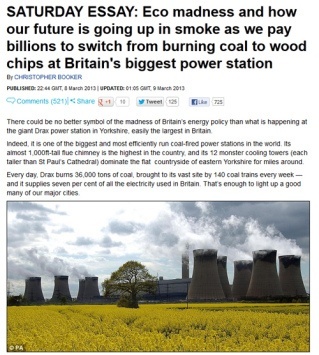We all care about the environment. But now we’re going to foolish extremes. And real people are getting hurt.
In conversations with individuals young and old, I’ve run up against a constant theme. Perhaps I’ve tried to explain why a particular green proposal is nonsensical once ill-founded assumptions are separated from cold facts. Perhaps I’ve mentioned that green activists alarm me because they are unelected and unaccountable.
The default, fallback position of good, solid, well-intentioned people usually amounts to: “Well, I think it’s important to protect the environment.”
Yes, we all love the environment. As a gardener and a photographer, few things attract me more than healthy, lush greenery.
But in the political arena, people who claim to be standing up for the environment often use that as a cover for something else. They’re trying to sell us on vegetarianism. They think capitalism should be swept away. They’re nostalgic for a simpler, Eden-like existence. They’re trying to convince themselves that they’re superheroes saving the planet rather than ordinary working Joes.
Or, they’re simply paying the bills, feeding their own machine. All those attorneys on staff at high-powered green groups cost money. All those rent payments for offices in multiple countries don’t come cheap.
When people say they think it’s important to protect the environment, surely we need to reply: Yes, but now were going to foolish extremes. And real people are getting hurt.
This past weekend, Christopher Booker, that iconoclastic granddaddy of UK newspaper columnists, published a tour de force titled: Eco madness and how our future is going up in smoke as we pay billions to switch from burning coal to wood chips at Britain’s biggest power station.
It’s a keeper. It’s the kind of essay we need to pass around because it demonstrates beyond a doubt that governments are prepared to do insane things in the name of protecting the environment.
In this instance, the UK is trying to meet emissions reduction – as well as renewable energy – goals. Therefore, its largest coal-fired power plant will, over the coming years, be retrofitted to burn wood chips instead.
In this brave new world that we who care about the environment have created, wood is call “biomass.” Green geniuses have decided that the CO2 that’s emitted when wood gets burnt doesn’t count. They’ve waved a magic wand and decided it doesn’t really exist. As Booker explains:
biomass is considered ‘sustainable’, because it supposedly only returns back to the atmosphere the amount of CO2 it drew out of the air while the original tree it came from was growing.
Take that accounting trick and add the bureaucratic ruling that wood is good because it’s a “renewable” source of energy and presto! we arrive exactly where the UK is today. In Booker’s words, most of the wood chips that will be burned at the UK power plant
will come from trees felled in forests covering a staggering 4,600 square miles in the USA, from where they will be shipped 3,000 miles across the Atlantic to Britain.
How, in a world in which we’re urged to obsess about our personal carbon footprint, can that possibly make sense?
For good measure, it turns out that huge piles of wood chips are a significant fire risk (the industry calls this “spontaneous ignition” or “spontaneous combustion“). And did I mention that everybody knows that the above plan will double the electricity bills of ordinary people?
The British government – which is responsible for writing the rules and regulations that have brought about this state of affairs – has lost its way. It’s now forcing power companies to do unbelievably dumb things in the name of being green. It’s playing games with an essential service on which lives and jobs depend.
Doubling electricity bills will harm pensioners, those on disability benefits, and impoverished kids. It will cause jobs to disappear. Piling hardship on top of hardship in this manner, pretending that real people won’t really suffer, is not morally defensible.
Even in the name of protecting the environment.
Read the entire Booker essay here. (Backup link here.)






